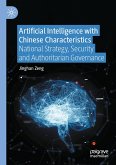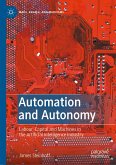The book takes a historic, contemporary and long-term approach to explain and anticipate AI's impact on IR - and vice versa - through a systematic treatment of nine theoretical paradigms and schools of thought including realism, liberalism, feminism, postcolonial theory and green theory. This book draws on original datasets, innovative empirical case studies and in-depth engagement with the core claims of the traditional and critical theoretical lenses to reignite debates on the nature and patterns of power, ethics, conflict, and systems among states and non-state actors.
Bhaso Ndzendze is Senior Lecturer and Head of Department: Politics and International Relations at the University of Johannesburg where he lectures a postgraduate course on technology dynamics in international relations. His recent books include The Political Economy of Sino-South African Trade and Regional Competition (Palgrave Macmillan) and Artificial Intelligence and International Relations with Professor Tshilidzi Marwala. He is also editor-in-chief of the journal Digital Policy Studies.
Tshilidzi Marwala is the Vice-Chancellor and Principal of the University of Johannesburg, South Africa. From 2013 to 2017 he was the Deputy Vice-Chancellor for Research and Internationalization. He is the Deputy Chairperson of the Presidential Commission on the Fourth Industrial Revolution (South Africa). His research interests are multi-disciplinary and they include the theory and application of artificial intelligence to engineering, computer science, finance, social science and medicine. His publication track-record includes more than 24 books and 350 articles in leading academic journals and the popular press.
Dieser Download kann aus rechtlichen Gründen nur mit Rechnungsadresse in A, B, BG, CY, CZ, D, DK, EW, E, FIN, F, GR, HR, H, IRL, I, LT, L, LR, M, NL, PL, P, R, S, SLO, SK ausgeliefert werden.









